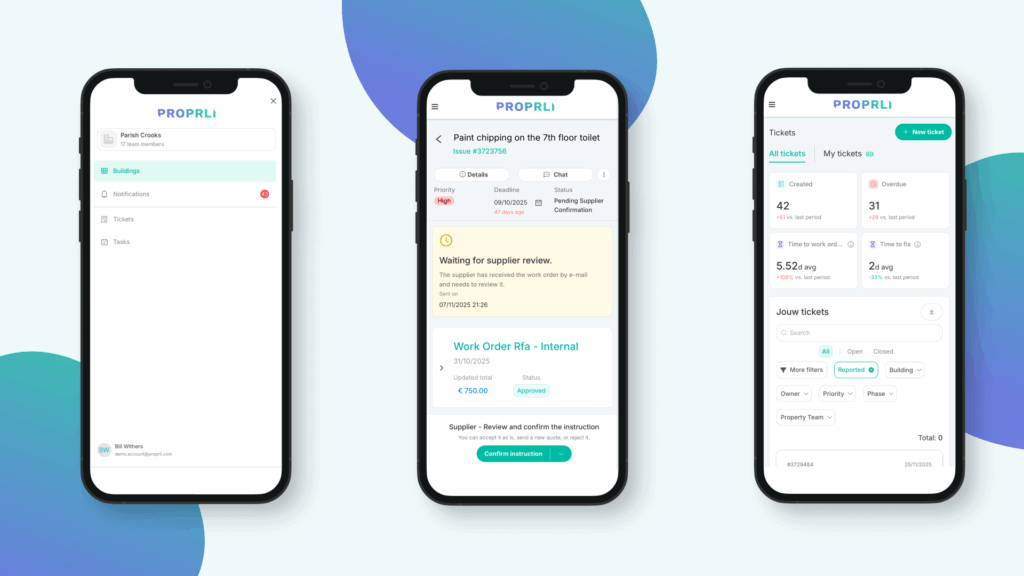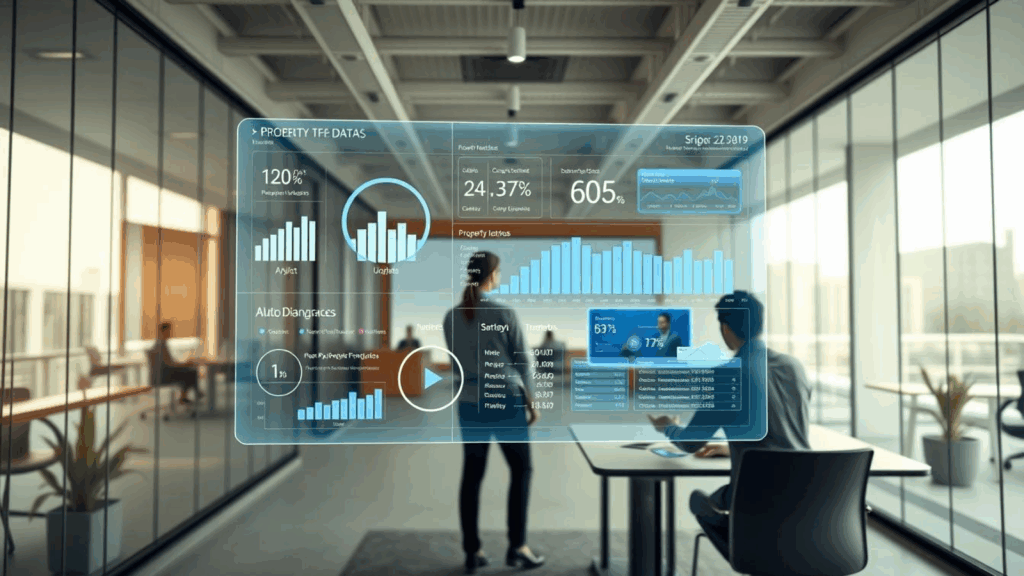The real estate sector, once slow to adapt, is now embracing advanced property management tech. This tech, including real estate software and rental management systems, is transforming the industry. It’s driving efficiency and shaping the future of real estate technology.
Looking ahead to 2025, the global real estate market is expected to grow at a 5% compound annual rate. This growth is driven by a rising population and the need for better housing and infrastructure. In the United States, real estate is a significant contributor to the economy, making up about 13% of GDP. This sector is growing rapidly, thanks to advancements in facility management apps and smart building technologies.
The connection between real estate and technology is becoming more apparent. Property data analytics are key in making informed decisions and improving asset performance. As we delve into the latest trends and predictions for 2025, it’s clear the industry is set for a major transformation and growth.
Key Takeaways
- Real estate industry embracing innovative property management tech solutions
- Global real estate market projected to grow at 5% CAGR through 2025
- US real estate sector accounts for 13% of GDP, fastest-growing segment
- Proptech innovations, smart building tech driving industry transformation
- Property data analytics crucial for informed decision-making and asset optimization
The Evolution of Property Management Technology
The real estate sector, once slow to adopt digital changes, is now rapidly evolving. Property management technology advancements are transforming the industry. Startups and established companies are using advanced technologies to improve operations and enhance tenant experiences.
In the last decade, the pace of real estate innovation has quickened. This is due to the need for efficiency, transparency, and data-driven decisions. Cloud-based systems and mobile apps for tenants have become widespread, changing traditional practices. They are creating a more connected and responsive environment.
The main goals of property tech disruption are clear. They aim to enhance the client and tenant experience throughout the property lifecycle. They also aim to empower property managers and investors with valuable insights for better decision-making. By using big data, artificial intelligence, and the Internet of Things, professionals can improve asset performance, cut costs, and offer personalized services.
As we move through the real estate digital transformation, several trends stand out:
- Cloud-based property management platforms for streamlined operations
- Mobile apps for seamless tenant communication and service requests
- Smart building technologies for energy efficiency and comfort
- Virtual and augmented reality for immersive property tours
- Blockchain for secure and transparent transactions
These advancements are changing how properties are managed and the relationships between managers, owners, and tenants. By embracing proptech, the real estate industry is set for a more efficient, sustainable, and customer-focused future.
Real Estate Industry Overview and Predictions
The real estate industry is a global giant, with commercial real estate assets nearing USD 9 trillion worldwide. Residential real estate is even larger, making it the biggest industry globally. In 2018, real estate investment hit a record €311 billion, as reported by CBRE, showcasing its vast growth potential.
Looking forward, the real estate market is expected to grow at a 5.00% compound annual rate from 2024 to 2032. This growth is fueled by a rising global population and increasing demand for quality housing and infrastructure. As people seek better living spaces, the sector’s outlook remains optimistic, offering opportunities for investors and developers.
In the United States, real estate significantly contributes to the economy, making up about 13% of the annual GDP. It’s also the fastest-growing sector, showing resilience and adaptability. This growth is driven by low interest rates, a strong job market, and rising consumer confidence.
| Region | Real Estate Market Size (2020) | Projected Growth Rate (2024-2032) |
|---|---|---|
| North America | USD 3.2 trillion | 4.5% |
| Europe | USD 2.8 trillion | 4.8% |
| Asia-Pacific | USD 2.1 trillion | 6.2% |
| Latin America | USD 0.5 trillion | 5.1% |
| Middle East & Africa | USD 0.4 trillion | 4.9% |
The proptech market is also gaining attention. Technology is transforming the industry, with property tech solutions becoming more prevalent. This shift is driven by the need for efficiency, transparency, and customer focus in real estate transactions and management.
In summary, the real estate industry is set for sustained growth and transformation. This is due to demographic changes, economic factors, and technological advancements. As the sector evolves, staying updated on trends and innovations will be crucial for professionals.
Defining Real Estate Technology
Real estate technology, or proptech, covers a broad spectrum of digital solutions. These tools aim to streamline and enhance various aspects of the real estate sector. They are used by agents, managers, investors, and consumers to boost efficiency. This includes managing properties, conducting transactions, and analyzing markets.
The real estate tech ecosystem is rich and varied. It includes software for managing properties and analytics tools for market insights. These innovations are changing how professionals and consumers engage with properties. They make processes more efficient, data-driven, and user-friendly.
Some key components of the real estate technology landscape include:
- Property management software: These platforms help property managers streamline tasks such as tenant screening, lease management, maintenance tracking, and financial reporting.
- Online listing platforms: Websites and apps that allow buyers, sellers, and renters to search for properties, view listings, and connect with real estate agents.
- Virtual and augmented reality tools: These technologies enable remote property tours and help buyers visualize potential renovations or design changes.
- Blockchain and smart contracts: Blockchain technology can be used to securely record property ownership and transfer data, while smart contracts automate the execution of agreements based on predefined conditions.
The real estate industry’s evolution makes proptech solutions more vital than ever. Businesses need these digital tools to stay competitive and meet consumer demands. By using these technologies, professionals can enhance their operations, make informed decisions, and offer superior client experiences.
The Symbiotic Relationship Between Real Estate and Technology
The real estate industry has always been connected to technology, but the last decade has seen a significant surge in real estate tech integration. With proptech adoption on the rise, the bond between real estate and technology is becoming more evident. This real estate digital transformation is changing how properties are managed, bought, sold, and experienced by all in the industry.
Property management innovation leads this technological shift. Technologies like virtual reality, artificial intelligence, and the Internet of Things have greatly enhanced real estate transactions. These innovations make operations more efficient, automate tasks, and offer a more engaging experience for clients.
The benefits of real estate tech synergy are vast. Some key advantages include:
- Reduced manual workload for property managers and real estate professionals
- Optimized property analysis and valuation through data-driven insights
- Automated routine tasks such as document processing, appointment scheduling, and data management
- Enhanced customer experience through personalized and interactive property showcases
- Increased transparency and accessibility of real estate information for all parties involved
As the real estate industry continues to adopt new technologies, the relationship between real estate and technology will deepen. By leveraging innovation, real estate professionals can save time, resources, and deliver better service to clients. The future of real estate is clearly tied to technology, and those who adapt will thrive in the coming years.
Top Real Estate Technology Trends for 2025
The real estate sector is undergoing a profound transformation, driven by proptech innovations. These advancements are reshaping the industry, bringing property management and transactions into the digital age. As we near 2025, several key trends are set to revolutionize property management, transactions, and the industry’s overall operation.
Artificial intelligence (AI) and machine learning are at the forefront of these trends. They empower property managers with tools to streamline operations and enhance decision-making. AI is poised to become a cornerstone of the real estate ecosystem, from AI-powered chatbots to intelligent algorithms for property maintenance.
Virtual reality (VR) and augmented reality (AR) are also gaining traction. These immersive technologies are transforming property tours, allowing remote exploration and real-time customization visualization. VR and AR are enhancing user experiences, reducing costs, and speeding up sales and leasing processes.
The Internet of Things (IoT) is another significant advancement. Smart buildings with IoT sensors and devices are optimizing energy efficiency and improving tenant comfort. IoT is revolutionizing property management, from automated temperature control to predictive maintenance alerts.
- AI and machine learning for streamlined operations and personalized experiences
- Virtual and augmented reality for immersive property tours and visualizations
- Internet of Things (IoT) for smart building management and predictive maintenance
- Big data analytics for data-driven decision making and market insights
- Blockchain technology for secure and transparent transactions and record-keeping
As the real estate industry evolves, embracing these proptech innovations is crucial for staying competitive. Technology-driven property management advancements will improve efficiency and enhance user experiences. The future of real estate technology is promising, and those who adapt and leverage these trends will thrive in the years ahead.
Artificial Intelligence: Transforming Property Management Tech
Since 2022, Artificial Intelligence (AI) has been making waves in the real estate sector. It’s set to become a cornerstone in property management soon. AI has transformed property management, making processes more efficient and automating mundane tasks. This saves time and effort for professionals in the field.
The GPT Store has introduced a variety of chatbots for different needs. As the GPT collection grows, users can find and implement AI solutions that fit their specific requirements. This streamlines property management even further.
AI tools have become more affordable and accessible, leading to their widespread adoption. Real estate professionals are now using AI to automate and optimize tasks. These tasks include AI lease abstraction, automated property valuation, and chatbots for customer support.
- AI lease abstraction
- Automated property valuation
- Chatbots for customer support
- Virtual assistants
- Property description generation
- Market trends analytics
- Investment and portfolio management platforms
- Natural language search
- Automated property management and maintenance
AI helps property managers streamline their work, cut costs, and boost performance. It automates routine tasks, allowing professionals to focus on more critical activities. This includes building client relationships and making strategic decisions.
| Traditional Property Management | AI-Powered Property Management |
|---|---|
| Manual data entry and analysis | Automated data processing and insights |
| Time-consuming tenant screening | Efficient tenant screening with AI algorithms |
| Reactive maintenance approach | Predictive maintenance using AI analytics |
| Limited personalization in marketing | Targeted marketing based on AI-driven customer segmentation |
AI is reshaping the real estate industry, and property managers who adopt these technologies will excel. By using AI, professionals can enhance efficiency, make better decisions, and provide superior value to clients. This positions them for success in 2025 and beyond.
The Rise of AI Virtual Assistants in Real Estate
Looking ahead to 2025, the real estate sector is on the cusp of a significant transformation. The adoption of AI virtual assistants and chatbots is expected to revolutionize property management. These tools will streamline mundane tasks, enhance customer service, and boost overall efficiency.
AI virtual assistants are capable of managing a variety of tasks. They can respond to common tenant queries, schedule viewings, and arrange maintenance appointments. Utilizing natural language processing and machine learning, these intelligent assistants offer personalized support 24/7 to both property managers and tenants.
AI chatbots in real estate stand out for their ability to automate repetitive tasks. They can integrate with property management software to send reminders, process payments, and update records automatically. This not only saves time for property managers but also ensures a smooth experience for tenants.
AI’s impact goes beyond customer support and administrative tasks. It’s also transforming predictive maintenance. AI algorithms analyze IoT sensor data and historical maintenance records to predict potential issues. This allows property managers to address repairs proactively, reducing downtime.
The integration of AI virtual assistants and chatbots into property management tech offers numerous benefits. These include:
- Enhanced customer service and tenant satisfaction
- Streamlined communication and faster response times
- Increased operational efficiency and reduced workload for property managers
- Improved data-driven decision making and asset optimization
As the real estate industry embraces AI, virtual assistants and chatbots will be crucial in shaping property management’s future. They automate tasks, enhance customer service, and provide valuable insights. These AI-powered tools are poised to revolutionize property management and optimization in the coming years.
Predictive Analytics for Data-Driven Property Valuation
The integration of predictive AI in real estate has transformed property valuation. AI property valuation tools and real estate data analytics enable professionals to make more accurate predictions. They automate the analysis of vast data, using artificial intelligence and machine learning. This technology examines historical data, market trends, and property attributes, offering precise property value and rental rate estimates.
Predictive analytics, powered by AI real estate market analysis, provides invaluable insights for strategic planning and portfolio management. These AI-driven real estate insights help property managers and investors stay competitive. They make informed decisions based on data-driven predictions. The automation of property valuation and rent prediction streamlines the process, saving time and resources while ensuring high accuracy.
| Traditional Property Valuation | AI-Powered Property Valuation |
|---|---|
| Time-consuming manual process | Automated and efficient |
| Limited data analysis capabilities | Analyzes vast amounts of data |
| Prone to human error and bias | Objective and data-driven |
| Reactive to market changes | Proactive and predictive |
The benefits of employing predictive analytics in property valuation are numerous:
- Increased accuracy in property value and rental rate predictions
- Improved efficiency and time-saving through automation
- Data-driven insights for informed decision-making
- Competitive advantage in the real estate market
- Enhanced portfolio management and strategic planning capabilities
As the real estate industry evolves, predictive analytics and AI-powered property valuation will become more critical. By embracing these technologies, property managers and investors can lead the way. They make data-driven decisions that optimize their portfolios and maximize returns.
Property Marketplace Technology: Facilitating Transactions
Property marketplace tech is poised to revolutionize the real estate sector in 2025 and beyond. These online platforms act as bridges between buyers and sellers, simplifying the home search process. They make it quicker, more convenient, and effective. The rise of proptech marketplaces mirrors a larger shift towards the sharing economy. By 2025, global online marketplace sales are expected to hit a staggering $8.1 trillion.
This shift in real estate technology signals a lasting change in digital transactions. Both buyers and sellers are gravitating towards these platforms for their convenience and efficiency. They allow users to explore listings, arrange viewings, negotiate terms, and finalize deals online with ease.
Key advantages of property marketplace tech include:
- Increased accessibility: Online platforms make it simpler for buyers to find suitable properties, regardless of their location.
- Enhanced transparency: Proptech marketplaces offer detailed property information, such as photos, virtual tours, and neighborhood data, aiding in informed decisions.
- Streamlined transactions: Digital transactions are quicker, more secure, and less error-prone than traditional paper-based methods.
- Cost savings: By cutting out intermediaries and automating processes, these platforms help reduce transaction costs for both buyers and sellers.
As the real estate sharing economy grows, property marketplace tech will become even more crucial. These platforms, powered by digital platforms and data-driven insights, are set to transform property buying, selling, and renting. They promise to revolutionize the industry in the coming years.
Blockchain’s Resurgence in Real Estate
After a brief hiatus, blockchain technology is back in the spotlight in the real estate sector for 2025. It stands out as a key trend, bringing unmatched transparency, security, and efficiency to property dealings. Blockchain’s digital ledgers ensure property transfers and lease agreements are secure and efficient, cutting down on the need for intermediaries like banks and lawyers.
Blockchain’s decentralized nature allows for property transactions and management to operate independently of government and financial institutions. This makes the process fully digital and highly secure. Smart contracts, powered by blockchain, automate contract execution. This boosts transaction efficiency and builds trust among parties in real estate deals.
Looking forward, blockchain is poised to play a significant role in two main areas of real estate:
- Tokenization: Blockchain enables fractional ownership of real estate assets. This opens up investment opportunities to a wider audience, democratizing the real estate investment scene.
- Smart Contracting: The integration of cryptocurrencies with smart contracts on the blockchain will revolutionize real estate transactions. It will enable seamless, secure, and instant transfers of funds and property ownership rights.
The return of blockchain in real estate is set to revolutionize the industry. It promises a new level of security, transparency, and efficiency in property transactions and management. As more real estate companies adopt this technology, we can anticipate a significant shift towards decentralized real estate management. This will lead to a more accessible, secure, and streamlined property market.
AI-Powered Contract Management Solutions
Artificial intelligence has transformed the real estate industry, especially in contract management. AI solutions have streamlined the process, making it less time-consuming. These tools use AI to extract important information from various documents, like leases and agreements, and input it into CRM systems.
AI lease abstraction stands out in contract management. It uses advanced algorithms to analyze lease documents, extracting key terms and data. This automation saves time and ensures data accuracy, reducing the risk of human error.
AI data entry is another significant trend. It automates the process of entering information into CRM systems, reducing manual effort and errors. AI algorithms can quickly identify and extract relevant data from documents and emails, ensuring data integrity.
AI is also revolutionizing real estate document automation. It can generate contracts and leases from templates, streamlining workflows. This reduces the risk of errors and ensures compliance with legal standards, allowing for faster service delivery.
The AI real estate contract lifecycle spans from creation to renewal. AI optimizes each stage, from negotiation to management. It helps in contract negotiation, monitors performance, and sends reminders for renewals or terminations. This enhances efficiency and risk management.
| AI Contract Management Solution | Key Benefits |
|---|---|
| AI Lease Abstraction | Automated extraction of key terms and clauses from lease documents, saving time and ensuring accuracy |
| AI Data Entry | Intelligent capture and input of data from various sources into the CRM system, reducing manual effort and errors |
| Real Estate Document Automation | Automated generation and customization of contracts and legal documents, streamlining workflows and ensuring compliance |
| AI Real Estate Contract Lifecycle | Optimization of the entire contract lifecycle, from creation to renewal, using AI technologies for enhanced efficiency and risk mitigation |
The real estate industry’s evolution makes AI contract management essential. These tools simplify tasks, enable data-driven decisions, and improve efficiency. By adopting AI, real estate companies can stay competitive and thrive in the changing property management technology landscape.
Conclusion
The real estate sector is undergoing a profound digital transformation. Startups and established companies are harnessing emerging technologies to transform various aspects of the industry. Looking ahead to the real estate tech future, it’s evident that proptech innovation will deeply impact property management, transactions, and client-tenant experiences.
Technologies like artificial intelligence, virtual reality, blockchain, and data analytics are reshaping the real estate landscape. These innovations bring numerous property management tech benefits, such as enhanced efficiency, better decision-making, and streamlined processes. As the real estate digital transformation progresses, it’s crucial for stakeholders to stay abreast of the latest proptech advancements. They must strategically integrate these into their operations.
Embracing real estate technology is key to staying competitive and adapting to the evolving market. By adopting these advancements, professionals can future-proof their businesses. They can also improve the value they offer to clients and tenants, thriving in the digital era. As we approach 2025 and beyond, the real estate industry is set for significant growth and innovation. Technology will play an essential role in shaping its future.
FAQ
What are the latest real estate technology trends for 2025?
The latest trends include AI, Machine Learning, and Cloud Computing. Big Data Analytics and Virtual Reality are also key. Smart Buildings, IoT, and Green Building Technology are making a mark. Predictive Analytics, 3D printing, and Drones are also transforming the industry.
How is artificial intelligence (AI) transforming property management tech?
AI is changing property management by automating tasks and boosting productivity. It enhances client satisfaction and management efficiency. AI is used for virtual assistants, chatbots, and automated valuation and analytics.
What role do AI virtual assistants play in real estate?
AI virtual assistants and chatbots streamline communication and automate tasks. They handle rent collection and maintenance scheduling. They provide 24/7 service, improving customer experience and agent efficiency.
How can predictive analytics benefit the real estate industry?
Predictive AI analytics analyze data to forecast property values and rental rates. This helps in strategic planning and portfolio management. It gives a competitive edge in the market.
What impact do property marketplace technologies have on real estate transactions?
Property marketplace technologies connect buyers and sellers or landlords. They make home searching fast, easy, and convenient. This shift indicates a permanent change in transaction processes.
How is blockchain technology being applied in real estate?
Blockchain creates secure digital ledgers for property transfers and lease agreements. It reduces reliance on banks and lawyers. Blockchain offers transparency, security, and efficiency in transactions and record-keeping.
What are AI-powered contract management solutions in real estate?
AI contract management tools automate extracting information from leases and agreements. They enter details into CRM systems. These tools optimize document management, a tedious task in real estate.
How can real estate professionals stay competitive in the digital age?
To stay competitive, professionals must keep up with proptech innovations. They should strategically incorporate these technologies into their operations. Embracing these advancements is crucial for future success.






